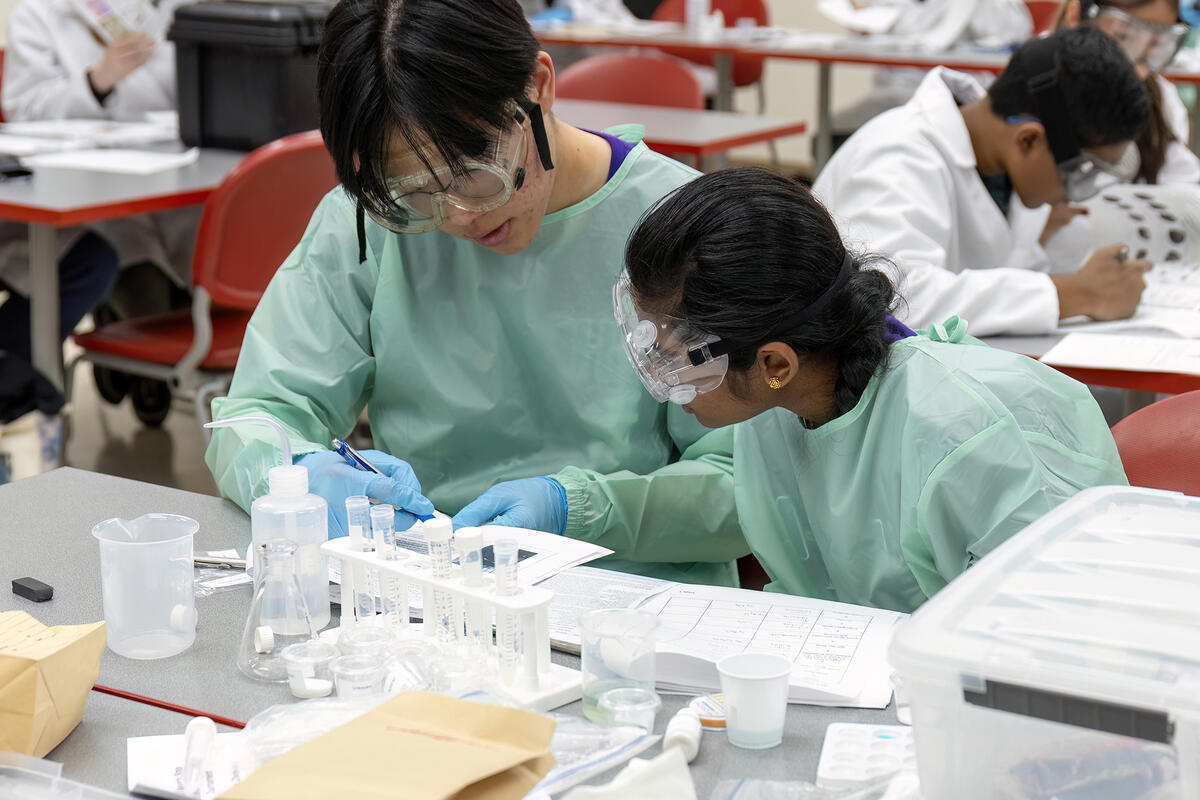Nearly 400 middle and high school students from across the state descended upon the UNLV campus this spring for a day of learning and competition during the annual Nevada Science Olympiad.
At the daylong event hosted by UNLV’s School of Integrated Health Sciences and Nevada Science Olympiad, students showcased their homemade projects in life science, personal and social science, earth and space science, physical science and chemistry, technology and engineering design, and inquiry and nature of science.
“Nevada Science Olympiad sparks curiosity and ignites passion for science in students,” said Tracy Viscosi, president of Nevada Science Olympiad. “It goes far beyond what we can do in a classroom. It allows students to find their interests and really delve into them.”
Emily Bilan, a recent graduate of Green Valley High School, has been participating in the Nevada Science Olympiad every year since the fourth grade. For this year’s contest, she built her own catapult that flung a ping pong ball across the room in the attempt to get it as close as possible to two targets on the floor.

Students in this particular contest were judged on distance and accuracy, having to catapult the ping pong ball as part of a competition inside the Robert Bigelow Physics Building.
Bilan, who plans to study biochemistry when she enrolls in UNLV this fall, created her catapult out of an old chopping board, scrap metal, ABS pipes, cloth, and glue.
“As a weight falls down a wide tube, it pushes the air into a narrower tube. The air then moves through the narrower tube at a faster rate than in the wide tube, which causes the ping pong ball to be launched out."
Students in various events showcased their science and engineering skills in unique ways. They constructed wheeled vehicles designed to operate without batteries and balsa wood towers designed for the highest efficiency. Others created robots capable of navigating a maze, programming them just minutes before learning the maze’s layout.
All contests were judged by volunteers within the science community, most of whom were UNLV faculty and students.
Inside the Student Wellness and Recreation Center, middle schoolers could be found flying their homemade model airplanes made of saran wrap and balsa wood, complete with a plastic propeller cut from a gallon-sized milk jug.
An Early Introduction to College
Viscosi, a UNLV graduate (’04 M.Ed. Educational Policy and Leadership), was a middle school science teacher before transitioning to a career in administration. She said partnering with UNLV exposes the middle and high schoolers to the possibilities afforded to them at the university level.
"Hosting this competition within a high school is valuable, but the true challenge and excitement for these students lies in competing at the university level," she said. "By allowing them to come to UNLV, sit in the classrooms, and collaborate with faculty and students, we ignite their interest in higher education and inspire their academic ambitions."
Anthony Espinoza, a student in UNLV’s mechanical engineering program, volunteered as an event supervisor for the Olympiad. He created the track dimensions for the wheeled-vehicle event and scored the student projects throughout the day.
“There were a lot of learning moments throughout the event for both the students and myself," he said. "Ultimately, I believe this sort of competitive environment is crucial for students. It allows them to apply the lessons they’ve learned in the classroom to create a personal, hands-on design project. Every student's level of preparation and effort was inspiring to see.”
Sharon Jalene, associate dean of academic and student affairs for the School of Integrated Health Sciences, has worked with Nevada Science Olympiad as UNLV’s representative for the past few years.
Jalene said funding for the event was provided by the President’s Office and the School of Integrated Health Sciences, with extensive additional services from Molly Rogowski in the Office of Admissions and Joanna Jezierska in the Office of the Executive Vice President and Provost.
“Nevada Science Olympiad highlights who we are as a research and educational institution and allows students and their parents to see what UNLV really does,” Jalene said. “It supports our Top Tier 2.0 mission and gives our students, especially the underrepresented students, a path to STEM.”
Lessons in Community Connection
The culminating awards ceremony, she said, makes the months of preparation worthwhile.
“Just to watch the sheer glee of the students makes this event so worth it. They were cheering for science like they were cheering at a football game,” she said. “I saw students cheering their competitors, and I think that’s a valuable lesson. Students are excited about science. It teaches volunteerism and community participation for our students as well. It’s good for UNLV, and it’s good for the state of Nevada.”
Bilan said connecting with other students who enjoy the sciences as much as she does is one of the reasons she's participated in the event every year for the past decade.
“In elementary and middle school, we spent a lot of time together as a team preparing for Nevada Science Olympiad. We would see each other every day at school, and at after-school and weekend practices. These experiences allowed us the opportunity to really get close to one another,” she said.
“Even after going our separate ways for high school, and through the COVID pandemic when the competitions went online, many of us remain friends and still participate in Nevada Science Olympiad. For the past few years, I’ve gotten to see many of my old teammates at the competition. Even though we are competing against each other, we still wish each other good luck and cheer each other on. It is nice to see how we all kind of ended up at the same place.”



